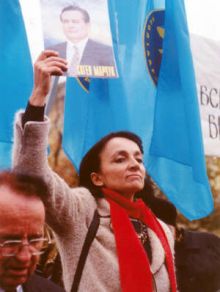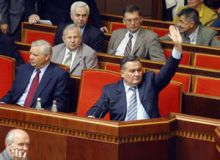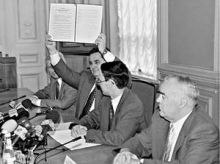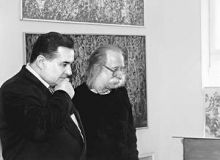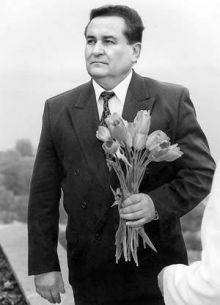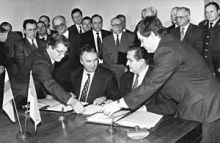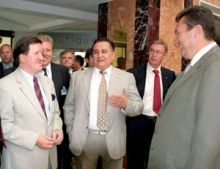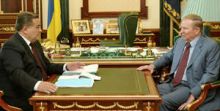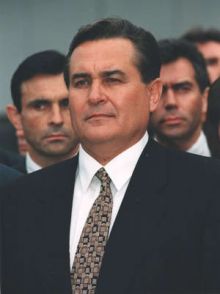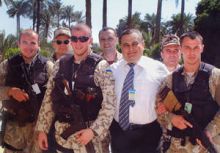The woman that you see in the picture is Daria TKACH from Lviv. Most of her life she worked as a documentary film director at the Lviv state television. Yet that is not how I would describe her. Tkach is in fact the author of many films on the outstanding figures of Ukrainian culture and politics — she always did everything by herself, including writing scripts, shooting, and editing. She is also well known as one of the organizers of the Lion Society, the Lviv-based nucleus of nationally-conscious young people, and head of the Beregynia section. It will be recalled that the Lion Society, founded still in the Soviet era (1987), was actively involved in the process of national renaissance later referred to as “promotion of civil society.” I will add that I have personally known her for about 30 years as a person who has always followed her own way of thinking and would never betray her ideals. She herself adds that, due to her dissident spirit and non-compliance, she ended up with a minimal pension and “a few patches of land” in a village — barely enough to survive. In spite of everything, Tkach says, “I love land, I like working, and the greatest joy for me is to see the sun in my grove, wash up in the river, and offer my own prayer.” She also says she has a lot of interesting projects in mind and is going to continue making her favorite documentary films.
Do you remember when this photo was taken?
“In the fall of 1999, before the elections, when Oksana Bilozir, Yevhen Marchuk’s proxy, came to Lviv. There was a mass rally next to the Shevchenko monument. I stood on the podium with Mr. Marchuk’s photo in hand.”
Do you still think Yevhen Marchuk was then the only candidate worthy of the presidency?
“Absolutely. Firstly, the intelligentsia supported Mr. Marchuk, which occurs extremely seldom. This was a great advantage for him.
“Secondly, I no longer remember the title of the book in which Mr. Marchuk exposed the wrongdoings of Kuchma and his inner circle, but I can remember the key idea — advance movement, i.e., a purely Ukrainian future, without copying somebody else’s experience, and a search for our own ways of building a state and Ukrainian life as a whole. This inspired people and raised their hopes. That was a virtual explosion, for nobody before Marchuk had ever exposed the current president’s misdeeds so clearly and consistently. The people believed him. Dissidents also opted for Marchuk, even though he had been in the Soviet secret services. The people expected Marchuk to pursue a new Ukrainian policy.
“I emphasize that this inspired a great hope.”
Do you remember 1999? What was the public mood, and your own?
“Let me recall again the rally in honor of Mr. Marchuk’s visit to Lviv. It stirred up unbounded enthusiasm and drew enormous crowds. I can remember how inspired Mr. Marchuk was when he saw the exultant people. Then we took him from Freedom Avenue to Shevchenko Avenue, where a press conference was held. The people looked radiant, for they entertained high hopes. I have never seen people in Lviv so elated from seeing a leader. Marchuk had great charisma.”
Why do you think the Russian scheme “a democrat vs. a communist” worked? Perhaps because there was no critical mass of thinking people?
“There wasn’t indeed. Powerful administrative resources were brought into play. I can remember all those meetings and the way Yurko Shukhevych and I canvassed for Mr. Marchuk. I can remember that presidential candidates other than Leonid Kuchma were barred from television. Once, after a talk show, I asked Tavpash [Svitoch manager – Ed.], a Kuchma proxy: ‘Who are you defending? You are an industrial manager, so how can you represent and defend a person who is ruining Ukraine’s industry?’ And I had so many labels pinned on me. I was harassed, summoned for interrogation, and had police reports drawn about me… I can remember an election campaign trip to Radekhiv. The district administration had gathered a large crowd in the local club. Sokoly and other highly-paid pop groups were on stage. I led Shukhevych onto the stage, but he was not even given the microphone. They dragged me to a police station and held me there for some time. They also victimized me in hospital. Then they came to my home and banged the door. My child was afraid and said: ‘Step aside from the window. They may shoot you.’ Lviv television denied me my favorite programs. That was unbearable and terrible. And then, when Shukhevych was harassed a day before the elections… And then, when they refused to show a recorded interview with Shukhevych which I had managed to organize…”
It is clear that the collapse of the Kaniv Four was also a ploy. Can you say what you thought of this? What was your reaction?
“I was, of course, greatly disappointed with this, but I still expected Marchuk to win. But here, too, a powerful administrative resource was brought into play. And what I said in answer to your previous questions is the result of the impact of that mighty administrative machine.”
Larysa Ivshyna once said: “In 1999 there was a president, but there was no people — in 2004 there was a people, but there was no president.” Do you also think that the coming of a leader such as Yevhen Marchuk, was premature for Ukrainians?
“No, I have never thought so. The coming of such a leader as Marchuk was not premature. But we do not know much about all kinds of ‘underwater currents’ in politics. We do not know what really happened there.”
Many people who did their best to stop Yevhen Marchuk can still be found in the corridors of power and on TV screens. What should be done today to attract new-quality people to politics — people with knowledge, a European mindset, and a clear idea of their country?
“In my opinion, there is such a leader somewhere in Ukraine — we just don’t know him. I think this should be a person who is absolutely free of corruption and bribery and has the clear vision of a Ukrainian Ukraine. We live in the center of Europe and we are a European nation — so our movement should be Europe-bound but with a pronounced Ukrainian coloring. My national idea is very simple: family-nation-native spirit. We do not see a leader who knows what native spirit is, for whom Ukraine is native, who will stand by his people to the end and would like, above all, to come back home, like Stepan Bandera, Roman Shukhevych, Yevhen Konovalets, and Mykola Mikhnovsky, whose programs contained progressive ideas about the equality of all nations in Ukraine whose representatives were in their governments and resistance movements. At the time, in 1999, we pinned great hopes on Marchuk: we knew that he was an intellectual person who strove to change life in Ukraine. And Marchuk would have succeeded, for he knew this system very well from inside and knew how to combat it. This is why there were such high expectations for him. And now we may need a civic movement and changes in the current Constitution, I do not know what to do with our Verkhovna Rada. There should be elections. But it is not simple – this requires work. I was in France a few months ago and saw Charles de Gaulle being honored. He did very much for France, during and after the war. But the French did not elect him president [right after WWII], it took him 12 years to gain the presidency. Let us extrapolate the situation onto Ukrainian realities: Ukrainians are not prepared for democracy. Seeking a job abroad has changed Ukrainians for the worse — the desire to do away at last with poverty deprives people of a spiritual light. What a pity de Gaulle is gone! Were there a de Gaulle or a politician like him now in Europe, there would be a different attitude toward Ukraine in the world. I wish we had elected one like him.”
COMMENTARIES
“I LEARNED VERY MUCH FROM YEVHEN MARCHUK…”
Marek SIWIEC, Member of the European Parliament:
“They say there is no place for friendship in politics, there are only common interests. That is wrong. I can say that whenever I think about Yevhen Marchuk, the first words that come into my mind are ‘friendship’ and ‘confidence.’ For many years on end, he and I were building Polish-Ukrainian relations on behalf of the presidents who were heads of our states at the time. Those were difficult years, when a new paradigm was being shaped. A new Ukrainian political identity was being established, national pride was being restored, and a not-so-smooth history was being opened up. Those were the times when Poland was taking pains to assert its presence in the West European economic and defense structures. We always spoke frankly and always achieved results. I learned very much from Yevhen Marchuk, a proud, wise, and, at the same time, modest person who never dodged even the most difficult issues. My best wishes of health and happiness from Brussels!”
“HE HAS ALWAYS VIEWED THAT DIVERSITY AS A STRENGTH RATHER THAN A WEAKNESS”
James SHERR, Head of the Russia and Eurasia Programme of the Royal Institute of International Affairs in London:
“Yevhen Kyrylovych’s birthday is a reminder that Ukraine’s statehood was once associated with progress. It recalls a time when leadership was synonymous with vigour, competence and courage. It is a reproach to those who confuse pragmatism with opportunism, cynicism and shabbiness. It also testifies to the ability of intellect, character and circumstance to alter the fate of individuals and overcome the legacy of the past.
“On the eve of Ukraine’s independence, Yevhen Marchuk was First Deputy Chairman of the KGB of the Ukrainian SSR. Virtually no one, least of all Marchuk himself, could have foretold that he would become an architect of Ukraine’s statehood, a barrier to those who would compromise its independence and a methodical proponent of its Euro-Atlantic course.
“This background (amplified by his tenure as first chairman of the SBU) has been a potent asset and an indelible liability. On the one hand, it has enabled him to understand the inner workings of the oligarchies, criminal structures and trans-national networks that dominate Ukraine’s economy and penetrate the state: an indispensable understanding to anyone who seeks to escape the treacherous waters of post-Soviet reality. This inheritance, along with experience in leading state posts, not only instilled confidence. It enabled him to bring an integrated and strategic approach to complex undertakings, culminating with his tenure as Minister of Defence between June 2003 and September 2004. On the morrow of that appointment, Hryhorii Kriuchkov, no instinctual supporter, observed: ‘Not every person can say ‘no’ to a high-ranking superior. To do this you have to have definite toughness and courage and firmly feel the ground beneath your feet, and Yevhen Kyrylovych has enough of that.’
“That inheritance and experience also instilled prudence, not only about the art of the possible inside Ukraine, but about the enduring attributes of Russian influence. For these reasons, Marchuk would have never allowed ‘nation building’ to take precedence over the development of a broad, secular and civic state, hospitable to the ethno-linguistic diversity of its citizens. He has always viewed that diversity as a strength rather than a weakness. For the same reasons, Marchuk has been a gradualist and a centrist by design as much as by temperament. Whether the issue was overcoming the legacy of Russia or Kuchma, he preferred to act methodically, but obliquely and by stages — at least insofar as circumstances allowed. Sometimes they did not. On several occasions in his career he showed elemental courage and put himself at risk. That story has yet to be written, and Yevhen Kyrylovych is still of two minds about writing it.
“The liability is threefold. In the first place, a person with Marchuk’s background will never be trusted by the country or its state leadership. Yevhen Kyrylovych has no business blaming himself for this. It is the product of what he is, rather than what he has done, and there simply is no way he can change it. In the second place, his talents, position and privilege made him the keeper of secrets he neither wished to know nor keep. Finally, given where he came from, he could not be an instinctual democrat. To his inestimable credit and to Ukraine’s benefit, he became a democrat — but out of decency and reason, rather than ideological predilection, and out of a growing repugnance towards the realities surrounding him.
“The 70th birthday of Yevhen Kyrylovych is not only a time to honour him. It is a time to remind ourselves that honour and fortitude, professionalism and insight can be found in public life. Those qualities are as much a part of Ukraine’s heritage as their negation and betrayal. Should they not be part of Ukraine’s future?”
“A STATESMAN WHO STRIVES TO MAKE HIS COUNTRY STRONG”
Oleg SOSKOVETS, First Deputy Prime Minister (1993-96), Russian Federation; president of the Russian Association of Financial and Industrial Groups:
“Yevhen Marchuk is an outstanding statesman of present-day independent Ukraine. He made a major contribution to the development of his state.
“And, naturally, much of the credit should go to Mr. Marchuk for the establishment of [good] relations between Ukraine and Russia. Once, on the instruction of presidents Boris Yeltsin of Russia and Leonid Kuchma of Ukraine, he and I took part in drawing up some crucial agreements between Russia and Ukraine, including one on the Black Sea Fleet. For this reason, close contacts with Mr. Marchuk allow me to characterize this person as a strong and responsible statesman who undoubtedly defended Ukraine’s interests for the sake of the state’s economic development and independence. I think the most distinctive feature of Mr. Marchuk was profound knowledge of domestic and foreign policies, which allowed him to make, undoubtedly, well-balanced and crucial decisions about the making of Ukraine’s statehood in the office of vice-premier, first vice-premier, and prime minister. And his further political and administrative activity as minister of defense and National Security and Defense Council secretary shows that this person is a statesman who strives to make his country strong. And, in my view, today’s Ukraine is a strong state. So I would like to join the numerous wishes that Mr. Marchuk is sure to be receiving on occasion of his 70th birthday. I would like to express to him my feeling of deepest gratitude and respect — a wish that can only be given to such prominent humans as Mr. Marchuk.”
“HE IS DISTINGUISHED FOR HAVING THE POWER OF FORESIGHT”
Leonid KRAVCHUK, first president of Ukraine:
“I can recall an incident that occurred when I was the Verkhovna Rada speaker. It was a very difficult time for Ukraine, with heavy clouds hanging over us. There was a difficult situation in Moscow, too. Tanks were moving towards Ukraine, Kyiv. Then Mr. Marchuk passed a note to me through some of his men, saying that he was taking extraordinary measures in this situation. He made a very serious effort to settle the situation. Mr. Marchuk is a businesslike and efficient person. His actions are not spontaneous or accidental. He studies everything. He was a good expert in his field, especially the [intelligence] services. When he headed the SBU, he kept me informed about everything. He kept me in the picture all the time. I knew the real state of affairs, especially during the abortive coup in Moscow. After the putsch, he did his best to minimize the likely consequences. He took a serious and responsible attitude to any assignment. Later, under Kuchma, he worked very much on a fundamental treaty with Russia and on the partition of the Black Sea Fleet. All these matters required great knowledge, intellect, and diplomatic skills. He is a man of culture. He is distinguished for being well-balanced and having a rare feature — the power of foresight.”
“HE BECAME A PHENOMENON OF THE UKRAINIAN REVIVAL IN THE 1990s”
Yurii SHCHERBAK, Ambassador Extraordinary and Plenipotentiary of Ukraine:
“Yevhen Marchuk is a unique figure in the Ukrainian establishment. As a real statesman with his own project for the country’s development and an ardent Ukrainian patriot, he has always been distinguished from most of his colleagues (not to mention the current rulers) by the depth of his strategic vision of Ukraine’s problems, and geopolitical realism while solving them. A unique combination of talent, intellect and experience of working in the intelligence services enabled Yevhen Marchuk to become a vivid phenomenon of the Ukrainian revival of the 1990s. Like Leonid Kravchuk, who had heated debates with the People’s Movement but realized his opponents were right due to his sober mind, Yevhen Marchuk, originating from the depths of the KGB, evaluated the role and importance of independent Ukraine in the system of the Euro-Atlantic security. Among the biggest achievements of Yevhen Marchuk, an active architect of Ukrainian statehood, is, in my opinion, his candid book Five Years of Ukrainian Tragedy (1999), which is a manifestation of the author’s boldness and his prominent role in elaborating and adopting the law ‘On Foundations of National Security of Ukraine,’ where Ukraine’s strategic task — joining NATO — is outlined. Whatever today’s rulers do to satisfy their masters by trying to darken Ukraine’s prospects, the battle is far from being over, and I am sure that in the end Marchuk will be proven correct. I have been honored to repeatedly see Yevhen Marchuk at work. Being the first minister of environment of Ukraine, I worked together with Yevhen Marchuk (at that time he was deputy prime minister for extraordinary situations) while dealing with the consequences of an ecological catastrophe; I saw how calmly, without fuss and unnecessary desperation, he solved complex problems, like a real statesman. The visit of Prime Minster Marchuk to the US (at that time I worked as Ukraine’s ambassador to the US) became an important milestone on the way of strengthening the strategic partnership between our countries. I remember what a good impression the refined English of our premier, his openness and broad vision made on members of the US government and the Congress. Already in early 2010, when the atmosphere in Ukraine changed drastically and some domestic strategists kept a low profile in fear, Yevhen Marchuk brilliantly held the Lviv International Security Forum where he persuasively argued the idea of Ukraine’s participation in structures of Euro-Atlantic security. He showed not only civic but also personal boldness when after a traffic accident in 2000, and the severe injuries he sustained, he rose from his bed and back into politics owing to his willpower and conviction. His homeland needs Yevhen Marchuk badly, [as he is] a faithful son of Ukraine.”
“FIVE LESSONS FOR UKRAINIAN POLITICS”
Mustafa DZHEMILIOV, people’s deputy of Ukraine, the head of Majlis of the Crimean Tatar people, Simferopol:
“Yevhen Marchuk is a unique politician, who possesses a combination of qualities like no other statesman in Ukraine that I know. His patriotism, unique competence in state governance, deep knowledge of history and skill of social forecasting, as well as experience in world history, political connections, and appealing human qualities have enabled him to play a unique role in Ukraine’s history, establish Ukraine’s first national patriotic special service aptly, and become head of the government. I am confident that if Yevhen Marchuk had been elected president of Ukraine, the history of our country would have developed in a completely different and much better way; our country would have played a completely different role in the world. Thus, for Ukraine in the 1990s and early 21st century Yevhen Marchuk was a unique chance to become a leading European state in a short time period and in all respects; it was a good opportunity to outdo Poland in terms of historical development, an opportunity to join the EU and NATO which, unfortunately, our country lost for many subjective reasons which didn’t depend on Yevhen Marchuk. Today, congratulating Yevhen Marchuk on his 70th anniversary, Ukraine is obliged to analyze his role in the development of the statehood and adopt, even if with delay, this sad lesson of history and, while there is still time, use the experience of Yevhen Marchuk in dealing with future politics. As a participant of the liberation movement of the Crimean Tatars for the return of the people to their homeland, I am well aware of the work of the Soviet KGB, which made many efforts to physically eliminate our people by means of deportation and political persecution. Only owing to his unique patriotic qualities and love of his motherland did Yevhen Marchuk manage to promptly establish a qualitatively new Ukrainian special service, which many Ukrainian patriots, who fought for their country’s independence and who were previously persecuted by the special services of the Soviet Union, including the Crimean Tatars, accepted as proper institution of their state. Unfortunately, later, in the 2000s, when dilettantes joined it, the Security Service of Ukraine lost these patriotic qualities, and became a primitive ‘secret political police,’ serving not the state but political and personal interests of certain politicians.
“Yevhen Marchuk has always been a very persuasive supporter of Ukraine’s independence. He played a decisive role in preventing the Crimea from becoming a hot spot in 1994-95, like Transnistria or Nagorno-Karabakh, and hence Ukraine retained its territorial integrity. The Communists and the Federal Security Service (FSB), who at that time launched active operations on forming a Russian enclave in the Crimea and wanted to destabilize post-Soviet Ukraine, didn’t succeed and lost their initiative. Above all this is owing to Yevhen Marchuk, who managed to disband the FSB-created regime of Yurii Meshkov and returned the Crimea to Ukraine’s legislative field. Yevhen Marchuk then managed something that is rare even for world-class politicians — he beat the FSB. Today, when the FSB feels at home in Ukraine, we don’t have politicians of this level, capable of achieving similar results. This is the second lesson of Yevhen Marchuk; already at that time he understood that after returning the Crimea to Ukraine and scraping its separatist constitution of 1992, solving the Crimean Tatar problem within international law and the theory of interethnic relations, based on human rights, was the second important task for Ukraine — that this could ensure stability on the peninsula and welfare in the country. It is owing to Yevhen Marchuk that the Crimean Tatar people still support Ukraine’s independence, that they are a strong state-building force, and not one of separatism, contrary to the FSB’s designs. He knew our problems, visited illegally built dwellings, knew people and their issues. Today, unfortunately, this work has stopped, the Crimean Tatar problem is not solved. In Ukraine, on the whole, there are very few politicians who understand interethnic relations in its global approach. There are few politicians capable of solving such complex problems, ensure interethnic peace and concord in the country. This is the third lesson of Yevhen Marchuk, which was not learned by Ukrainian politics. Yevhen Marchuk is a highly professional state official. He worked with the Cabinet of Ministers and headed the government. Unfortunately, Leonid Kuchma, who was inferior in professionalism and organizational skills, competence and knowledge of foreign languages, quickly understood that exactly owing to this the Cabinet of Ministers headed by Marchuk and not the president will become the center of power and a leading structure of governance in Ukraine. I remember Kuchma dismissed Yevhen Marchuk right after his trip to the Crimea, where Marchuk had already created an integral program on restructuring the economy and social relations; he planned a quick development of the autonomy as a leading region of Ukraine. When Kuchma was asked about his motives, he answered: for creating his own image. Kuchma simply didn’t know Marchuk couldn’t work with negligence and without a professional approach, and therefore he didn’t understand that the image was created by means of competence and professionalism, not words. After this Kuchma always tried to keep Yevhen Marchuk closer and use his experience, professional qualities and competence. He appointed him secretary of the Security Council in a team characterized first of all by its competence. Unfortunately, later Leonid Kuchma staked on other people. And this is the fourth lesson of Yevhen Marchuk. He possesses a huge life and political experience, a skill for solving many socio-economic problems. But after 2004 the government belonged to people considerably inferior in experience and competence. No wonder he advanced an idea about ‘studying to become president.’ Yevhen Marchuk understands that governing is a complex art requiring unique political, moral and personal qualities, which few politicians in Ukraine possess. Unfortunately, when president, Viktor Yushchenko didn’t consider it expedient to use the experience of Yevhen Marchuk in solving many socio-economic problems and paid for this with political fiasco. If he had used this experience, the results of his five-year presidency would have been completely different. One can say that Viktor Yanukovych is so far making the same mistakes — Marchuk’s experience remained unwanted in the current government structures. And this is the fifth lesson of Marchuk, which was not adopted by Ukrainian politics.”
“UNFORTUNATELY, HE APPEARS RARELY IN OUR MASS MEDIA”
Ivan DZIUBA, member of the National Academy of Sciences of Ukraine:
“It’s always interesting to read and listen to Yevhen Marchuk. He is a deep-thinking analyst and his articles, speeches and TV interviews contain unusual and profound thoughts about our social problems, seen from a Ukrainian state position. Unfortunately, he appears rarely in our mass media; I wish he would engage in more journalistic activity, as he is an experienced politician.
“The current officials could at least sometimes listen to the opinion of Yevhen Marchuk — they would benefit from it! Congratulating Yevhen Marchuk on the jubilee, I’d like to wish him good health, creative energy and further fruitful participation in Ukraine’s public life.”
“The OPERA CAN BE THANKFUL TO YEVHEN MARCHUK FOR HIS ASISSTANCE”
Petro CHUPRYNA, director general and artistic director of the National Opera of Ukraine:
“I was lucky enough to personally get to know Yevhen Marchuk. He is a great person, one with a wide range of talents. A stage of our country’s development is connected with the name of Yevhen Marchuk. One can remember the stormy 1990s and the new millennium — Yevhen Marchuk has remained a symbolic figure for our country. I like that he often visits our theater. He appreciates and knows high art. Despite being very busy, even when he was actively involved in political and economic life, he always found time for plays and concerts. Yevhen Marchuk is a person open to communication. Not only is he very knowledgeable in esoteric aspects of classic and contemporary music, but also a very erudite and competent person. I am amazed that he, being not a musician but an amateur, knows academic music on such a professional le-vel, and has such a good knowledge of works by foreign and Ukrainian composers. It’s interesting to talk to him about different topics. Yevhen Marchuk can listen — this is a person who always keeps his word. I recall our easygoing meetings in different years on different occasions. Our team is thankful to Yevhen Marchuk for his support and assistance. He belongs to the most talented governors of our state. I’d like to remember the time when he was prime minister — not an easy time in an economic sense, so he always asked about our needs whenever he dropped by. Not only did he listen to us, he really helped. At that time we had delays in financing (a problem for buying equipment, financing different art projects, etc.). I can thank Yevhen Marchuk for helping to develop our theater: to a great extent it is Yevhen Marchuk’s merit that today the National Opera of Ukraine is the country’s prime stage and the capital’s trademark. I want to wish Yevhen Marchuk good health, energy, complete realization of all his plans, assisting Ukraine’s development, and also happiness in his personal life.”
“DEFENDED THE STATE’S IMAGE”
Oleksandr SHARKOV, foreign intelligence service veteran, colonel-general of the International Police Public-Safety Corporation:
“I got acquainted with Yevhen Marchuk back in 1968. At that time I was a graduate student at the radio and physics department of the Kyiv State University, and Yevhen Marchuk was an agent of the first KGB department of Ukraine. Yevhen Marchuk was born in a deep province — in a village of Kirovohrad region, in a peasant family. Though he was too young to remember, he experienced the burden of the war and post-war time as well. Having graduated from the Kirovohrad Teachers Training Institute, already in 1963 he was invited to work for the foreign intelligence service of the Soviet Union. And he did not just get into the KGB, but to the illegal section. I should mention that selection to those services was very thorough. One should possess special features for this. During the work for the intelligence service he passed a unique training course which, generally, very few people in Ukraine have passed. As an intelligent person, Yevhen Marchuk was quickly promoted. His professional growth didn’t stop. He was appointed the head of the regional KGB and later became the deputy head of the KGB in Ukraine. In this time processes which led to the collapse of the Soviet Union started. As a good organizer, in 1990 he was appointed for the post of the state minister for defense, state security and extraordinary situations. Already after the proclamation of Ukraine’s independence Yevhen Marchuk became the first head of the Security Service of Ukraine, which he headed until 1994. In this period I worked with him — in the national intelligence services, which I later headed. For me it was a very creative period of my work in the state security bodies. I saw Yevhen Marchuk every day, communicated with him a lot, solved different issues, and therefore I can say that we were very lucky that Yevhen Marchuk was the head of the Security Service of Ukraine. Not only did he organize the work but also worked a lot himself — often at night. Being the head of such a respected organization, Yevhen Marchuk was one of the best heads of special services I have seen in the time of my work in this area. He went from junior representative to the head of the Security Service of Ukraine, from lieutenant junior grade to general in the Army. One can count such people on one’s fingers. Soon, as we know, Yevhen Marchuk became deputy prime minister, acting prime minister, and finally, prime minister of Ukraine. He was elected as the people’s deputy, and headed a committee and a faction in the Verkhovna Rada. Moreover, in 1999 he was a presidential candidate. It was a very difficult time, because Yevhen Marchuk was against Leonid Kuchma. The political campaign of 1999 resulted in not only political but also physical victims. Actually today we still didn’t analyze that difficult period at length. The personnel of the Security Service of Ukraine and many other officers of law-enforcement and special bodies of Ukraine supported Yevhen Marchuk. They saw a real president in him, a person who could lead Ukraine out of the difficult situation. Leonid Kuchma won. Yevhen Marchuk, despite severe persecution, received many votes. To take into account the interest of these people, Leonid Kuchma offered him to head the Council for National Security and Defense. I became his advisor. We all remember the beginning of the 2000s — the murder of Gongadze, the cassette and kolchuga scandals. At that time Yevhen Marchuk did a lot to protect the country’s image on the international arena. He participated in many important negotiations for Ukraine. In 2003 he was appointed minister of defense. Marchuk became the first civilian minister of defense. He tried to reform the army, but worked only for a year. After the Maidan of 2004 he became an advisor to president. As a wise and experienced person he is needed today as well, because the events happening in our state require intelligent people. He is an extraordinary person, there are not many people like him among today’s politicians. I still maintain good relations with Yevhen Marchuk. He achieved high positions in both special services and on state posts. And he deserved it. He fulfilled his duty before the people, and therefore enjoys their respect. We are very lucky that in the stormy times when we were building our country there was a person like Yevhen Marchuk among its high officials.”
“HOW MANY RIGHT STEPS COULD BE MADE”
Ihor PASICHNYK, rector of the Ostroh Academy National University:
“There are different types of politicians. For many of them power is like a narcotic. They can’t live without it. And they don’t bother thinking what good they can do with it. But there are politicians who gain power to use it to do something important and constructive. These are builders. And obviously only they can be called prominent. No doubt, Yevhen Marchuk belongs to this category. He is a person of extremely big potential and high culture, yet at the same time a modest person, not showing off his merits, not involved in self-aggrandizing. He was lucky in a way. He found himself among the people in whom fate entrusted the development of the young Ukrainian state. Some of them coped with this difficult task, others didn’t. I hope objective historians will have their say in the future. The role of Yevhen Marchuk in these processes was considerable, and this must not be overlooked. He created the Security Service of Ukraine, and did a lot to normalize the situation in the Crimea. To a great extent it is owing to him that the Crimea didn’t become another hot spot on the post-Soviet territory. Taking high state positions — those of prime minister and minister of defense — Yevhen Marchuk demonstrated professionalism and (what is important!) real patriotism. He was also always interested in Ukrainian culture, trying to sustain promising cultural initiatives and projects. For example, he did a lot for Eastern Europe’s oldest educational establishment — the Ostroh Academy. He repeatedly visited it, brought his friends, and spoke to students. When he was the minister of defense, it was his initiative to pass the buildings of the military town in Ostroh to the academy. This crucial decision was quite logical in view of the fact that the military detachment was disbanded. But would another head of the ministry make this decision? And how many correct steps of this kind could have been taken if Yevhen Marchuk had been elected president? Both teachers and students remember. Moreover, among the numerous politicians who visited the academy he was one of few to make a real contribution to its revival. Seventy looks like a substantial figure. However, I think General Marchuk still has a lot of steam and is destined to realize many things in the future. So: Happy birthday!”

